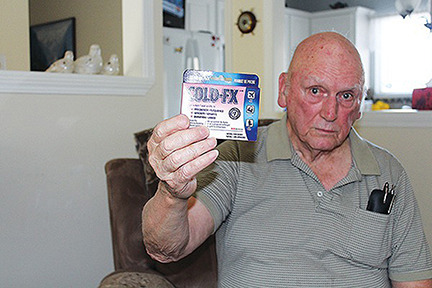A Vancouver Island-based lawsuit against the cold remedy Cold-Fx is a lawyer-manufactured action in search of a victim and not worthy of class-action certification.
Or at least that was the argument advanced by lawyers for the drug giant Valeant Pharmaceuticals earlier this month in a New Westminster courtroom.
To be certified, an applicant must show the existence of a genuine class with common issues defined by objective criteria, states a response filed March 31 by defence lawyer Alan D’Silva.
“This case fails on all counts. It is a lawyer-driven action with no real complainants and a hopelessly overbroad class,” it states.
The suit alleges the defendants Valeant and Afexa Life Sciences misled consumers into thinking Cold-Fx was capable of relieving flu and cold symptoms if taken for periods of less than two months despite testing that indicated otherwise.
B.C. Supreme Court Justice Janice Dillon is being asked if this 2012 claim by Ladysmith senior Don Harrison against the makers of the popular product can be expanded to include virtually anyone who used it between 2004 and 2012. Valeant ended four years of relative silence on the matter in court with a multi-pronged 128-page critique that claims lawyer John Green has failed to demonstrate the need for class-action certification.
Its response states Green recruited Harrison as a “placeholder” applicant, adding the suit lacks evidence that Harrison or others “…were exposed to the alleged misrepresentations; that such representations influenced their purchase; or that they were disappointed in the results.
“Despite (Green’s) relentless four-year campaign, Mr. Harrison remains the sole representative plaintiff and no evidence has been provided to show that any other individual is genuinely interested in pursuing the alleged claims as part of a class action.”
D’Silva also presented the testimony of consumer behaviour expert Michael Mulvey that the promotional material people were exposed to and the reasons they bought the product are too individualized for a class-action case. The defendants also maintain the case does not warrant the complexities and expense of a class proceeding.
“This is not a claim alleging personal injury in relation to a latent and inherent danger in a product that surfaces years after purchase, for instance, harm caused by breast implants, heart defibrillators, or hip implants,” the suit states. “This is a theoretical claim which at its highest is an efficacy claim for pure economic loss, alleging complaints in regards to treatment of the common cold.”
It called the “lack of any genuine complainant” unsurprising because Cold-Fx is the number-one selling cold-and-flu product in Canada, and 95% of users are happy with its results.
“If any consumers were genuinely displeased with Cold-Fx’s efficacy, they could at any time have availed themselves of a full refund, which has been offered by the defendants since Cold-Fx’s inception.”
In a statement posted to the lawsuit’s Facebook page on April 9, Green said he has been contacted by people across Canada who wish to be part of the British Columbia class action, including large numbers from Ontario. The statement asks for people to continue submitting contact information.
“It will also help counter the suggestion by Valeant that everyone is happy with Cold-Fx and that nobody cares about determining if it engaged in the conduct alleged in this class action,” Green said.
Justice Dillon heard the certification case April 4-8 and has reserved her decision, which deals strictly with class action portion of the lawsuit. With or without certification, Green still has to prove the suit’s claims.
In an interview prior to the most recent hearing, he was confident the suit will be certified and he will be able to proceed with an action that will make the defendents accountable, while delivering a stern warning to any health remedy company making, or considering making, false claims.
“Given that the statements we say were fraudulent concerned efficacy, dosage, and dosage duration (all regulated by Health Canada), we are confident that the defendants have an uphill battle now,” he said.
Source: www.cowichanvalleycitizen.com





Be the first to comment on "Defence Lawyers Argue Against Class-Action Certification"